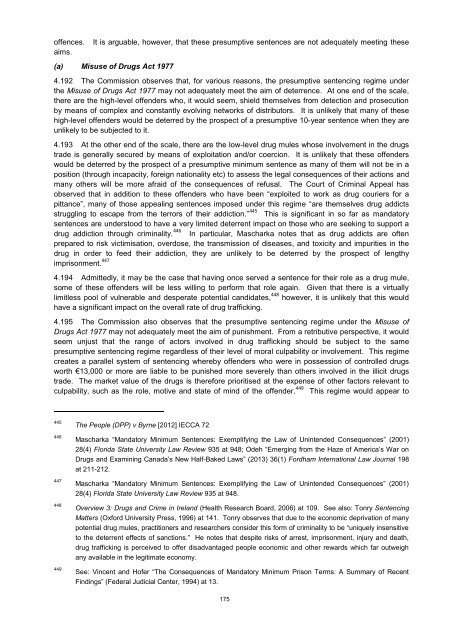Report on Mandatory Sentences - Law Reform Commission
Report on Mandatory Sentences - Law Reform Commission
Report on Mandatory Sentences - Law Reform Commission
Create successful ePaper yourself
Turn your PDF publications into a flip-book with our unique Google optimized e-Paper software.
offences.<br />
aims.<br />
It is arguable, however, that these presumptive sentences are not adequately meeting these<br />
(a) Misuse of Drugs Act 1977<br />
4.192 The Commissi<strong>on</strong> observes that, for various reas<strong>on</strong>s, the presumptive sentencing regime under<br />
the Misuse of Drugs Act 1977 may not adequately meet the aim of deterrence. At <strong>on</strong>e end of the scale,<br />
there are the high-level offenders who, it would seem, shield themselves from detecti<strong>on</strong> and prosecuti<strong>on</strong><br />
by means of complex and c<strong>on</strong>stantly evolving networks of distributors. It is unlikely that many of these<br />
high-level offenders would be deterred by the prospect of a presumptive 10-year sentence when they are<br />
unlikely to be subjected to it.<br />
4.193 At the other end of the scale, there are the low-level drug mules whose involvement in the drugs<br />
trade is generally secured by means of exploitati<strong>on</strong> and/or coerci<strong>on</strong>. It is unlikely that these offenders<br />
would be deterred by the prospect of a presumptive minimum sentence as many of them will not be in a<br />
positi<strong>on</strong> (through incapacity, foreign nati<strong>on</strong>ality etc) to assess the legal c<strong>on</strong>sequences of their acti<strong>on</strong>s and<br />
many others will be more afraid of the c<strong>on</strong>sequences of refusal. The Court of Criminal Appeal has<br />
observed that in additi<strong>on</strong> to these offenders who have been “exploited to work as drug couriers for a<br />
pittance”, many of those appealing sentences imposed under this regime “are themselves drug addicts<br />
struggling to escape from the terrors of their addicti<strong>on</strong>.” 445 This is significant in so far as mandatory<br />
sentences are understood to have a very limited deterrent impact <strong>on</strong> those who are seeking to support a<br />
drug addicti<strong>on</strong> through criminality. 446 In particular, Mascharka notes that as drug addicts are often<br />
prepared to risk victimisati<strong>on</strong>, overdose, the transmissi<strong>on</strong> of diseases, and toxicity and impurities in the<br />
drug in order to feed their addicti<strong>on</strong>, they are unlikely to be deterred by the prospect of lengthy<br />
impris<strong>on</strong>ment. 447<br />
4.194 Admittedly, it may be the case that having <strong>on</strong>ce served a sentence for their role as a drug mule,<br />
some of these offenders will be less willing to perform that role again. Given that there is a virtually<br />
limitless pool of vulnerable and desperate potential candidates, 448 however, it is unlikely that this would<br />
have a significant impact <strong>on</strong> the overall rate of drug trafficking.<br />
4.195 The Commissi<strong>on</strong> also observes that the presumptive sentencing regime under the Misuse of<br />
Drugs Act 1977 may not adequately meet the aim of punishment. From a retributive perspective, it would<br />
seem unjust that the range of actors involved in drug trafficking should be subject to the same<br />
presumptive sentencing regime regardless of their level of moral culpability or involvement. This regime<br />
creates a parallel system of sentencing whereby offenders who were in possessi<strong>on</strong> of c<strong>on</strong>trolled drugs<br />
worth €13,000 or more are liable to be punished more severely than others involved in the illicit drugs<br />
trade. The market value of the drugs is therefore prioritised at the expense of other factors relevant to<br />
culpability, such as the role, motive and state of mind of the offender. 449 This regime would appear to<br />
445<br />
446<br />
447<br />
448<br />
449<br />
The People (DPP) v Byrne [2012] IECCA 72.<br />
Mascharka “<strong>Mandatory</strong> Minimum <strong>Sentences</strong>: Exemplifying the <strong>Law</strong> of Unintended C<strong>on</strong>sequences” (2001)<br />
28(4) Florida State University <strong>Law</strong> Review 935 at 948; Odeh “Emerging from the Haze of America’s War <strong>on</strong><br />
Drugs and Examining Canada’s New Half-Baked <strong>Law</strong>s” (2013) 36(1) Fordham Internati<strong>on</strong>al <strong>Law</strong> Journal 198<br />
at 211-212.<br />
Mascharka “<strong>Mandatory</strong> Minimum <strong>Sentences</strong>: Exemplifying the <strong>Law</strong> of Unintended C<strong>on</strong>sequences” (2001)<br />
28(4) Florida State University <strong>Law</strong> Review 935 at 948.<br />
Overview 3: Drugs and Crime in Ireland (Health Research Board, 2006) at 109. See also: T<strong>on</strong>ry Sentencing<br />
Matters (Oxford University Press, 1996) at 141. T<strong>on</strong>ry observes that due to the ec<strong>on</strong>omic deprivati<strong>on</strong> of many<br />
potential drug mules, practiti<strong>on</strong>ers and researchers c<strong>on</strong>sider this form of criminality to be “uniquely insensitive<br />
to the deterrent effects of sancti<strong>on</strong>s.” He notes that despite risks of arrest, impris<strong>on</strong>ment, injury and death,<br />
drug trafficking is perceived to offer disadvantaged people ec<strong>on</strong>omic and other rewards which far outweigh<br />
any available in the legitimate ec<strong>on</strong>omy.<br />
See: Vincent and Hofer “The C<strong>on</strong>sequences of <strong>Mandatory</strong> Minimum Pris<strong>on</strong> Terms: A Summary of Recent<br />
Findings” (Federal Judicial Center, 1994) at 13.<br />
175
















